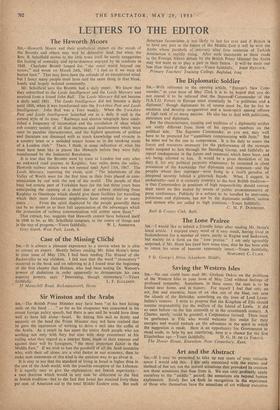LETTERS TO THE EDITOR
The Haworth Moors
SIR,—Haworth Moors and their symbolical impact on the minds of the Brontes. and others may well be debatable land, but when the Rev. B. Scholfield moves to the little town itself he surely exaggerates the feeling of centrality and up-to-dateness enjoyed by its residents in 1848. Charlotte Brontë longed for "the outer world beyond our moors," and wrote on March 24th, 1845, "1 feel as if we were all buried here." That may have been the solitude of an exceptional mind, but I fancy many people must have said the same thing in that bleak, lonely and largely isolated community. Mr. Scholfield says the Brontës had a daily paper. We know that they subscribed to the Leeds Intelligencer and the Leeds Mercury and received from a friend John Bull. The Leeds Mercury did not become a daily until 1861. The Leeds Intelligencer did not become a daily until 1866, when it was transformed into the Yorkshire Post and Leeds Intelligencer. John Bull was a Tory weekly. When the Yorkshire Post and Leeds Intelligencer launched out as a daily it said in the rotund style of its time: "Railways and electric telegraph have estab- lished a frequency of locomotion and the circulation of ideas which rob country society of all that inertness and incuriousness which were once its peculiar characteristics, and the highest questions of politics and literature are discussed with as much knowledge and vivacity in a country town or a secluded manor house as in the smoking room of a London club." There, I think, is some indication of what life must have been like in places like Haworth before they were fully transformed by the Industrial Revolution.
It is true that the Brontës went by train to London but only after an awkward road journey to Keighley, four miles down the valley. Haworth railway station was not opened until April 13th, 1867. The Leeds Mercury, reporting the event, said: "The inhabitants of the Valley of Worth were for the first time in their lives placed in com- munication by rail with the rest of the world. The people of that busy but remote part of Yorkshire have for the last three years been anticipating the opening of a short line of railway stretching from Keighley to Oxenhope which should give them facilities for travelling which their more fortunate neighbours have enjoyed for so many years. . . . From the spirit displayed by the people generally there can be no doubt as to their full appreciation of the advantages which the possession of railway communication will confer upon them."
That extract, too, suggests that Haworth cannot have believed itself In 1848 to be, as Mr. Scholfield imagines, in the centre of things and
in the van of progress.—Yours faithfully, W. L. ANDREWS. - Grey Garth, West Park, Leeds, 6.


































 Previous page
Previous page